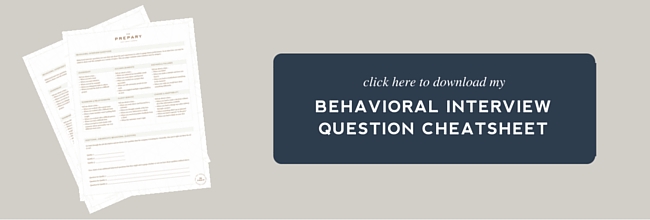If you’ve gone on a job interview before then you’re probably familiar with these 6 words:
Tell me about a time when…
This is the way most behavioral questions start. Behavioral interview questions are ones that ask you for examples of situations from your past in order to judge how you might react in similar situations in the future.
They are used to gauge lots of different things, ranging from job-specific skills to general qualities like leadership, work ethic, and teamwork. While I could probably make a list 100 questions long, here are 20 super common behavioral interview questions in a few of the most typical categories.
They all start with: “tell me about a time when…”
Leadership
…you led a team
…you took initiative on a difficult project
…you led by example
Accomplishments
…you achieved an incredible result for your team
…you felt proud of your work
…you went above and beyond on a project
Dealing with Challenges
…you made a mistake and how you troubleshooted and/or fixed it
…you failed at something
…something didn’t go as planned
Teamwork & Relationships
…you worked with a difficult manager and/or person
…you went above and beyond to help a coworker
…you were working on a team and someone wasn’t pulling their weight
Client Service
…you went above and beyond for a customer
…you received positive feedback from a customer or client
…you knew the customer was wrong
Job-Specific Knowledge
…you worked on a project where you [insert type of task from job description]
…you had to use [program, skill, or quality from job description] to get the job done
Change & Adaptability
…you had to think on your feet
…you had to make a decision with incomplete information
…you went through a big change at work
So now that we’ve discussed some of the most common behavioral questions, how should you answer them?
First, describe the situation at hand.
Give details, but make sure it’s not overly technical and that you don’t get too in the weeds. Basically, you want to give the interviewer an adequate understanding of the situation at hand without confusing them or putting them to sleep.
Then, explain your part in it.
After laying the groundwork for what example you’re going to talk about, show how you fit into the story. People aren’t asking you behavioral interview questions to hear what other people did — they want to know what you did.
Lastly, share the result or outcome.
When being asked about positive examples, like accomplishments or leadership abilities, this is your chance to shine. Don’t be afraid to take credit where it’s due, as it’s the exact right opportunity to do so.
When describing negative examples, make sure you are being diplomatic and owning your mistakes or your role in tough situations. No one wants to hire someone who is constantly blaming others.
Have an interview coming up? Get our free cheatsheet here!






